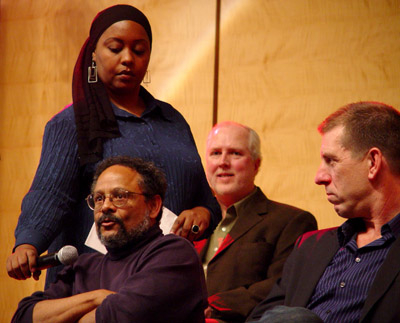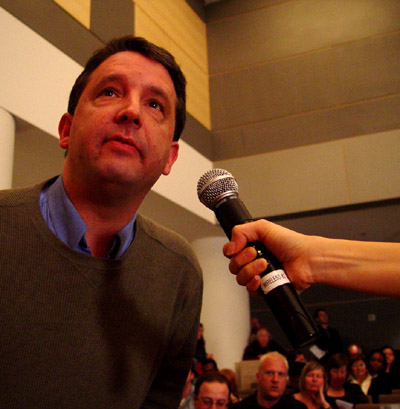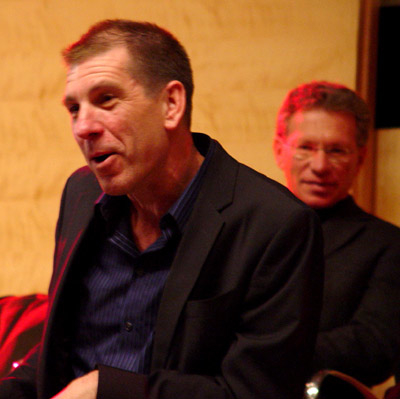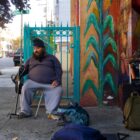 |
| Moderator Hana Baba holds the mic for UC Berkeley Graduate School of Journalism dean Neil Henry while Guild rep Carl Hall and Tom Murphy of RedwoodAge.com look on./ Michael Strickland |
Journalists, publishers and media innovators who gathered Tuesday evening for a public forum were adamant about finding new journalism models in the wake of the San Francisco Chronicle’s cutbacks and possible closure.
“Journalism is no longer a passive activity,” said David Cohn, founder of Spot.Us, an open-source project that develops “community-funded reporting.” “Journalism is participatory. What we need are thousands of online startups. … One or two will survive.”
Approximately 150 residents attended “A Conversation About The Chronicle,” held at the San Francisco Public Library’s main branch. The Northern California Chapter of the Society of Professional Journalists organized the discussion after the Hearst Corp. – which owns the Chronicle –announced in late February that it would be forced to sell or close the paper if it could not make needed “critical” cost-cutting measures. On Saturday, the Northern California Media Workers Guild, which represents about 500 Chronicle employees, agreed to concessions that would allow the company to cut about 150 union jobs and eliminate some benefits. Those cuts could begin as soon as this week.
During the two-hour community forum, co-moderated by KALW’s Rose Aguilar and Hana Baba, the 14-person panel agreed the newspaper model is broken. They cited free online news content, Craigslist classifieds and debt-burdened “subprime” publishers purchasing too many papers as some of the reasons.
Oakland Tribune editor Martin Reynolds said newspapers are failing because they “have been so profitable for so long that there hasn’t been a culture of change.”
 |
| An audience member asks the panelist about the future of journalism./ Michael Strickland |
Panelist Tom Murphy of RedwoodAge.com and Newswire21.org said that he thinks it may take time for journalism to evolve with the Internet and that there are many models out there.
“We’re trying to figure out what works,” said Murphy, who is also a member of The Public Press steering committee.
Panelist Owen Rogers, a partner at the interactive design consultancy IDEO, said, “It’s all about your readers. Stop telling them what they need. Ask them what they want.”
“We have to look at saving journalism,” said panelist Carl Hall, a local representative for the California Media Workers Guild and a Chronicle science writer. “What’s important is the craft.” He added that he does not know what model will work, but that the Guild will support whatever it is. Regardless, should Hearst decide to sell or close the paper, Hall said union would want to try to buy it.
 |
| Guild rep and Chronicle reporter Carl Hall with California Media Collaborative director Louis Freedberg in background. / Michael Strickland |
Other panelists included Neil Henry, dean of the UC-Berkeley Graduate School of Journalism; Dr. Dina Ibrahim, director of broadcast journalism at San Francisco State University; Maria Mejia, editor of El Mensajero; Bruce Brugmann, publisher of the San Francisco Bay Guardian; Michelle Fitzhugh-Craig, news editor of The Public Press;
Louis Freedberg, California Media Collaborative director; Dr. David Robinson, senior lecturer at the Haas School of Business; Ricardo Sandoval, SPJ board president Northern California Chapter and assistant city editor at the Sacramento Bee; and David Weir, veteran journalist, BNET.
The forum was live-streamed over the Internet on SFGTV and recorded for broadcast on SFGTV and KALW-FM 91.7.










